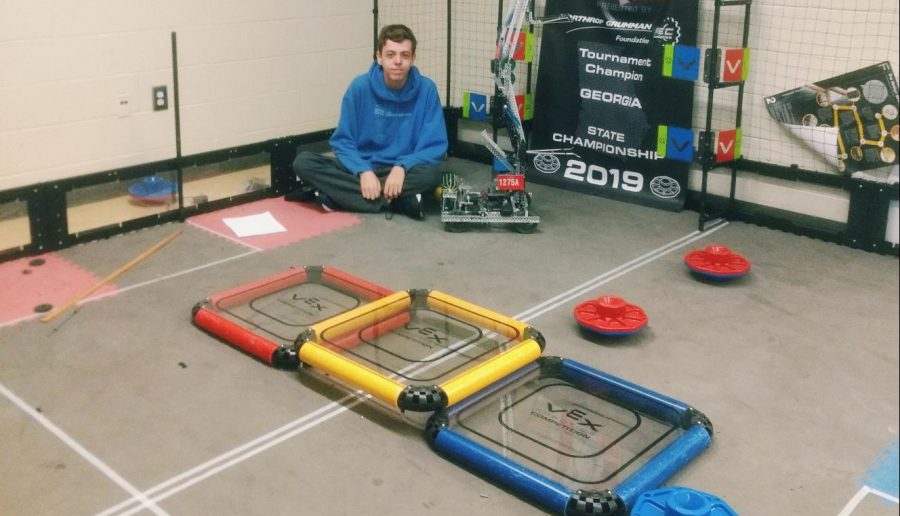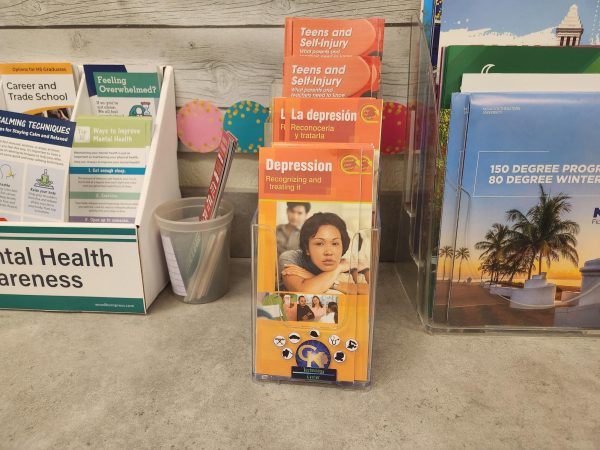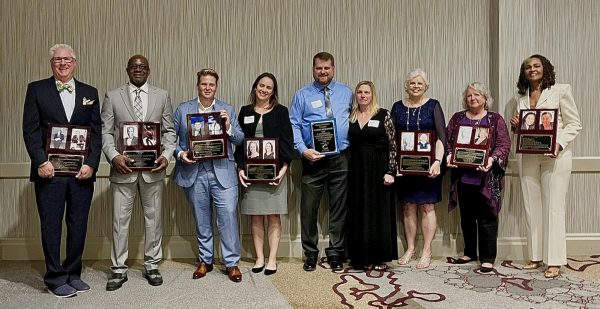Robotics Team Gears Up for International Competition
Photo courtesy of Robotics Team.
Andrew Council sits next to his robot.
For the Chamblee Charter High School VEX Robotics team, no problem is too vexing. Using a combination of technology, engineering, and research, these high school students are learning how to change tomorrow’s world – today.
The general concept of VEX Robotics is fairly simple.
“VEX Robotics, it’s a robotics competition that happens between multiple different levels. We’re in the high school level of the competition,” said VEX Robotics member and junior Andrew Council. “Basically, it involves a couple of metal robots that we build and we put it on a large field with three other robots and we compete and we win tournaments.”
Each year, there is a new broad goal the robot should compete.
“This year’s competition is called ‘Turning Point’ where the main objective of this one is where there are flags that you have to flip onto your color and there are caps that are one side’s one color and the other and you have to flip it and it’s all about turning things on your color,” said sophomore Eric Shindell.
The plastic caps, which look like oversize bolts, and flags, which look like small plastic flaps, are located on the field. There is a detailed scoring system that the VEX competitions are based on. For example, if the robot picks up a cap and moves it to the ground, the team can score one point. If they place it on the low-lying fence around the field, they can earn two points.
With all this complicated scoring, it may seem like the scores would vary- but there is a typical range.
“It would mostly be in the twenties,” said sophomore and team member Jacob Donovan.
Shindell, Donovan, and Council’s team, which also includes senior Nathan Webb, decided to take a specific approach to maximize points.
“Most other robots that the other teams made focused on turning flags where you had to have a catapult to launch balls and sort of hit the flags,” said Shindell. “We, instead of focusing on that, we do have a catapult, but since both other teams focused on that, we focused more on the lift, where we are able to flip the caps.”
This approach has paid off. Their VEX Robotics team has, indeed, won several important tournaments at the local and state level. Enough, in fact, that they qualified for the VEX Worlds.
“The way worlds qualifications works is, so you have to qualify for the state tournament by getting certain awards at local tournaments, and once you qualify for the state tournament, at the state tournament you either have to do well at skills, which is a separate competition where you go by yourself on the field and score as many points as you can, or you have to place well in bracket,” said Council.
There’s also a specialized award for skills a bit different from the traditional engineering concepts.
“We have a design notebook that logs all the stuff we do, and you have to do well at that,” said Council “If you do well at that, then you can earn an award for that and then send you to the world. The way we did it is we won the tournament, so that qualified us.”
The actual worlds competition is still far off, so there is still time for the team to prepare. In fact, their preparation process began a long time ago.
“Coming home from last year’s worlds competition, we were basically starting the designs and we’ve been working on it since then, so … we kind of plan it out and then we build it, and then if it doesn’t work, we rebuild it completely, or change parts,” said Council.
The parts are very specific to the competition.
“You order them from the VEX website itself and we use aluminum because it’s lighter and steel is heavier,” said Donovan.
There is scientific reasoning for this material choice.
“If it’s lighter, it’s faster,” said Shindell.
They have also incorporated zip-ties and half cuts to maximize efficiency.
This is their team’s second year of going through the process, so their decisions are backed by experience.
“Last year, when we started off, we had kind of no idea what we were doing and then we got good last year, and so this year, we were already good going in, so we had a lot stronger footing going in,” said Council, “We didn’t have to waste as much time on trying to get past the learning curve, so we were already fairly experienced, and that experience just kind of carried up pretty easily.”
This will be his second year at the competition, and although it is far away, he is still excited.
“It’s in April, it’s in Louisville, Kentucky at the large convention center where they did the Muhammad Ali fights and the derbys and everything, and it’s like we miss three days of school [plus the weekend], so it’s like five days and it’s basically just all VEX, all day,” said Council.
Senior Erica Izaguirre attended the VEX Worlds Competition last year and still has fond memories.
“It’s like the biggest conference that you can imagine, because there are still companies there, showing off their things, but also there’s just the competition, so it’s basically a tournament on steroids,” said Izaguirre. “There are hundreds of teams from around the world and a lot just from the US and so it’s so big,”
Council recalls several specific countries where teams came from last year.
“Last year, we talked to a Turkish team, a Spanish team,” said Council “The university-level actually has a lot of Mexican teams, there are some Japanese teams, a lot of U.K. teams.”
Both Council and Izaguirre found value in all of their social interactions at the competition.
“I had a really great time there, because even though you’re competing against the best teams in the world, it was still a good experience, because we see how other people do things, we interact with people that we normally wouldn’t get a chance to and everyone there is really enthusiastic about it, everyone’s putting in their all, everyone’s trying so hard,” said Izaguirre.
The huge size required some logistical planning, using divisions.
“Each of them [divisions] had about 50 to 70 teams, maybe,” said Izaguirre. “And then you go through their qualifying rounds … so you basically play against random teams, which they just generate a random match schedule, and then at the end of, I think two days of those, it’s the tournaments for each division, where it’s a bracket and then it’s single round elimination.”
For now, there’s very little Council and his team can do besides focus on their robot, and have a little bit of faith in themselves.
“In theory, we might do well,” said Council. “But worlds are a lot more random because they break you up into eight divisions, so we’ll kind of see. We’ll roll the dice.”
Your donation will support the student journalists of Chamblee High School Blue & Gold. Your contribution will allow us to print editions of our work and cover our annual website hosting costs. Currently, we are working to fund a Halloween satire edition.

Hope Williams is a senior staff writer. When she's not churning out articles, you can find her playing with her cats or going on a hike. This is her second year on the staff.





